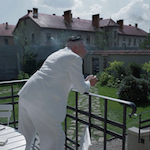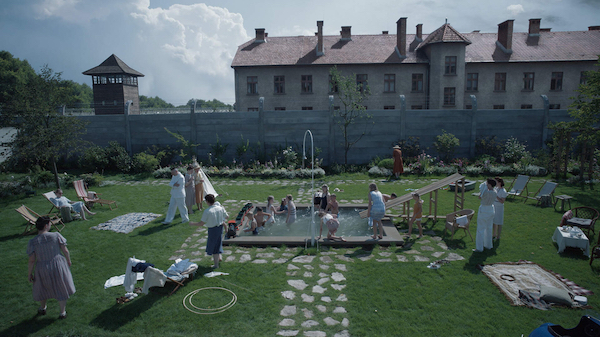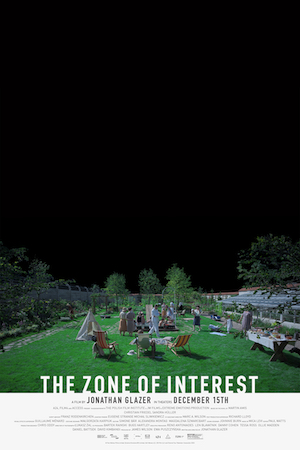 If they were in America, Rudolf (Christian Friedel, THE WHITE RIBBON) and Hedwig (Sandra Hüller, who just got a best actress nomination for ANATOMY OF A FALL) would say they were living the American dream. They’re in a big new house near a river where they can swim and fish. They have a bunch of kids and a dog and their backyard is huge, with an elaborate garden, cobblestone paths, a huge greenhouse, a nice deck, and a small swimming pool with a slide. They even have servants. All because Rudolf’s doing so good in his job. And they live right next to work, so he doesn’t have to commute at all, he’s home right after work to spend time with the family. The kids love him (they got him a canoe for his birthday), and he and Sandra get along well, they make each other laugh, they talk about the trips they’ll go on after all this.
If they were in America, Rudolf (Christian Friedel, THE WHITE RIBBON) and Hedwig (Sandra Hüller, who just got a best actress nomination for ANATOMY OF A FALL) would say they were living the American dream. They’re in a big new house near a river where they can swim and fish. They have a bunch of kids and a dog and their backyard is huge, with an elaborate garden, cobblestone paths, a huge greenhouse, a nice deck, and a small swimming pool with a slide. They even have servants. All because Rudolf’s doing so good in his job. And they live right next to work, so he doesn’t have to commute at all, he’s home right after work to spend time with the family. The kids love him (they got him a canoe for his birthday), and he and Sandra get along well, they make each other laugh, they talk about the trips they’ll go on after all this.
It’s the biggest possible “all this,” though: World War II. And I think you’ll share my objection to Rudolf’s job. He’s the commandant of Auschwitz. A very bad person. The conceit of writer/director Jonathan Glazer (SEXY BEAST, BIRTH, UNDER THE SKIN)’s gut punch of a movie is to matter-of-factly depict the mundane activities of this family as they go through their daily activities without a thought to the suffering they’re causing and benefiting from on the other side of the wall.
A few times we glimpse prisoners cleaning Rudolf’s boots or being marched through the reeds. Mostly we hear them: distant, indiscernible yelling, screams, crying, constant muffled gun shots. We hear churning machinery, trains arriving, we see black plumes coming out of the chimneys. All the while the Höss family have parties, gossip with friends, look at the flowers, take smoke breaks on the deck. Since our eyes go to where the action is, even we may focus on the backyard party in the sun and not the barbwire and watch tower visible in the top half of the frame.

It’s striking how naturalistic it all is. It has very little music, and I read that they did the mix in mono because when they heard the Atmos surround it felt sensationalistic. I also read that they built cameras into the house so they could shoot without crews as the actors improvised normal household activities. Yeah, that makes sense.
The kids run around playing like real kids. These look like people from a different time and place, but also like us. Rudolf seems like a loving dad. In one scene he’s wading out in the river fishing, wearing his tank top with the SS logo, enjoying himself, suddenly he steps on something, realizes it’s a human jawbone or something. He gets the kids out of the water, rushes them home, scrubs them off in the bath tub. Man, he is not happy with his employees. Another time he dictates a letter about how they’re cutting the lilacs wrong and it’s gonna ruin things for everyone. He also writes a letter praising someone’s contributions to the camp and trying to convince them not to transfer this guy. Couldn’t have done it without him. He has opinions about how they need to run this place. Doesn’t want them to fuck it up. Takes pride in his work.
 One of the best subplots is about Hedwig’s mother coming to visit. Hedwig proudly shows her around, points out all the different flowers, talks about how hard they were to grow. Mom keeps saying how lovely it is, how proud she is of her girl, she’s really landed on her feet. “And that’s the camp?” Hedwig says yeah, we grow vines over the wall to make it look nice, tries to keep talking about her garden. Mom wonders aloud if Mrs. Silberling, the lady whose house she used to clean, is in there. Says it sounding curious, like it would be interesting to know, not like there’s malice intended. Man, this is so familiar to me, the older generation being able to rationalize what society has come to, never question it, and keep a positive attitude. But maybe it’s just an act. She keeps coughing and looking up at the chimneys.
One of the best subplots is about Hedwig’s mother coming to visit. Hedwig proudly shows her around, points out all the different flowers, talks about how hard they were to grow. Mom keeps saying how lovely it is, how proud she is of her girl, she’s really landed on her feet. “And that’s the camp?” Hedwig says yeah, we grow vines over the wall to make it look nice, tries to keep talking about her garden. Mom wonders aloud if Mrs. Silberling, the lady whose house she used to clean, is in there. Says it sounding curious, like it would be interesting to know, not like there’s malice intended. Man, this is so familiar to me, the older generation being able to rationalize what society has come to, never question it, and keep a positive attitude. But maybe it’s just an act. She keeps coughing and looking up at the chimneys.
Not everyone can ignore it. It seems to me the dogs and horses keep being distracted by things they hear. They recognize the sounds of suffering that the humans have taught themselves to overlook. There are a few interludes of locals who do care – I mistook the high contrast, night vision type scenes as dreams, but it turns out they’re the real story of a young woman Glazer met as an old lady while researching. The actress wears the real woman’s dress and rides her bicycle. Look it up, it’s an interesting story.
The biggest conflict for the couple is that Rudolf does such a good job of mass murder that he gets promoted to inspector of all the camps and has to move. To his shock, Hedwig makes him ask if the family can stay at the residence in Auschwitz while he works in Oranienburg. It’s really diabolical the way this movie made me wince at how selfish and materialistic she’s being even though her genocidal war criminal husband deserves so much worse than his wife being unreasonable. There are signs that even he knows that, and I think that’s important. He might have misgivings, but they don’t stop him. That doesn’t exonerate him, it makes him even worse. As you can imagine from the premise, the genius of THE ZONE OF INTEREST is that it shows these actual historical monsters not as unimaginable villains who will be vanquished, but as that other thing they also are – petty, pathetic, boring, normal people. They are following beliefs that have become acceptable in their country. They support their government and fear who they think are their enemies. They love their families, they protect their possessions, they believe they work hard and are good people and deserve success. This is not to humanize them, it’s to remind us that the point of never again isn’t just stop them from doing it again. It’s also don’t become them.
It’s kind of crazy that it can be rated PG-13 since the atrocities are off screen – the very reason it’s so powerful. I think approaching this topic from such an original angle not only makes it a profound record of the Holocaust, it also makes it feel almost painfully timely. There’s this part where Hedwig is trying on a fur coat, finds some lipstick in the pocket, sits down at the mirror and puts some of it on. I was slow, I thought she was checking if this old thing still fits, juxtaposing her casual vanity with the horrors we hear going on outside the window. But then I caught on that of course this, and many of the other material items they’re so attached to, were stolen from the people they put into those camps. And I couldn’t help but think of videos circulating social media in the last month of IDF soldiers laughing and showing off what they’ve looted from houses they’ve destroyed in Gaza, or a wife bragging about all the makeup her husband sent home for her. THE ZONE OF INTEREST is important history, but it can’t help but also be an urgent warning about current events, whether it was meant that way or not.
I know this isn’t really the type of movie you can recommend that easily. For what it’s worth, when I first heard about it I thought it sounded amazing and also I wasn’t sure I could even watch it. Seeing the trailer in a theater was the first time I had a glimpse of what exactly it was and felt like maybe I could take it. And I could. For me it wasn’t as gut-wrenching as THE ACT OF KILLING, for example. But it’s similarly haunting and hard to stop thinking about. I think it’s a masterpiece. I sure won’t forget it any time soon.


























January 29th, 2024 at 9:14 am
Yeah, I would put ZONE OF INTEREST solidly in the category of “really impressive, really glad I saw this, highly recommend, may not be up for ever watching again.”
I saw this alongside someone who had absolutely no idea what to expect – they’d been told by a friend to see it with no foreknowledge, so they avoided reading anything online, seeing the trailer, etc. I on the other hand felt like I had a pretty good idea of what this would entail, having been aware of the novel when it first came out and then very intrigued when I read that the director of UNDER THE SKIN was adapting it – and it still felt unique and disturbing.
The scene with the mother looking at the camp wall and musing about whether her neighbor was in there, and how bummed she was not to get the curtains when the family was taken from their home – that is some bleakly funny shit. Made me think about part of Primo Levi’s memoir, THE PERIODIC TABLE, where he describes being interned at a concentration camp but marched every day through the streets of the adjoining town, alongside other scientist inmates, to work alongside townfolk in a local laboratory. As I recall it, Levi tells the story to undermine the idea that people outside the camps had no idea what they were…
About halfway through the film, the house lights came up briefly a few times in quick succession, so along with the movie onscreen, everyone in the theater could see each other sitting there. If you told me this was intentionally designed into the movie itself, I’d believe it.